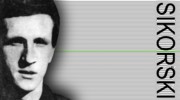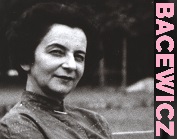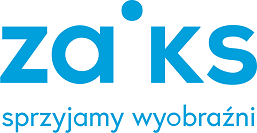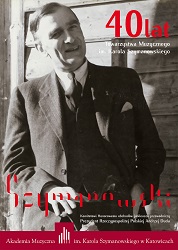 W 2017 roku Towarzystwo Muzyczne im. Karola Szymanowskiego obchodzi jubileusz 40-lecia działalności. Obchody rozpoczynają się 1 marca w Katowicach XX edycją festiwalu „Wieczory z muzyką Karola Szymanowskiego”.
W 2017 roku Towarzystwo Muzyczne im. Karola Szymanowskiego obchodzi jubileusz 40-lecia działalności. Obchody rozpoczynają się 1 marca w Katowicach XX edycją festiwalu „Wieczory z muzyką Karola Szymanowskiego”.
Zjazd założycielski Towarzystwa miał miejsce 1 października 1977 w Zakopanem w willi Atma, gdzie kompozytor mieszkał w latach 1930-35. W 1976 Atma została przekształcona w Muzeum Karola Szymanowskiego i jest oddziałem Muzeum Narodowego w Krakowie oraz siedzibą Towarzystwa. W skład pierwszego zarządu Towarzystwa weszli m.in. Andrzej Bachleda Curuś (prezes) oraz Wojciech Kilar i Witold Rowicki (wiceprezesi).
W skład obecnego Zarządu Towarzystwa wchodzą: prof. Joanna Domańska (prezes), prof. Eugeniusz Knapik, dr hab. Arkadiusz Kubica, prof. AM (wiceprezesi), prof. Sławomir Czarnecki i Józef Kolinek. Celem Towarzystwa jest popularyzacja osoby i twórczości Karola Szymanowskiego, najwybitniejszego po Fryderyku Chopinie kompozytora polskiego. Swą misję Towarzystwo realizuje organizując festiwale muzyczne w Zakopanem i Katowicach, koncerty krajowe i zagraniczne, konkursy wiedzy o kompozytorze, wykłady, wystawy. W 2012 Towarzystwo zainicjowało projekt „Międzynarodowe Konkursy Muzyczne im. Karola Szymanowskiego” w Katowicach. Dotychczas odbyły się 2 edycje konkursu kompozytorskiego, w których wzięło udział 315 kompozytorów z 36 krajów świata i pierwsza edycja konkursu kwartetów smyczkowych, którego laureatami zostały zespoły z Czech i Wielkiej Brytanii. Planowane jest rozszerzenie projektu o następne dyscypliny artystyczne: skrzypce, śpiew i fortepian.
Komitetowi Honorowemu obchodów przewodniczy Prezydent Rzeczpospolitej Polskiej Andrzej Duda.
ZOBACZ: Program Festiwalu.








 Polish conductor, composer and an honorary member of the
Polish conductor, composer and an honorary member of the  Violinist David Grimal and Sinfonietta Cracovia will perform the next concert of the "Stars with Sinfonietta" cycle, which will be held on March 7, 2017 at the Krakow Philharmonic.
Violinist David Grimal and Sinfonietta Cracovia will perform the next concert of the "Stars with Sinfonietta" cycle, which will be held on March 7, 2017 at the Krakow Philharmonic. 2 marca 2017 roku w Nadbałtyckim Centrum Kultury o godz. 19:00 odbędzie się pierwszy w tym roku koncert z cyklu „Nowa Muzyka w Starym Ratuszu” pt. „Muzyka i komputery”.
2 marca 2017 roku w Nadbałtyckim Centrum Kultury o godz. 19:00 odbędzie się pierwszy w tym roku koncert z cyklu „Nowa Muzyka w Starym Ratuszu” pt. „Muzyka i komputery”.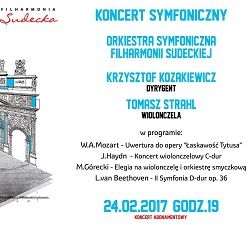 Cellist Tomasz Strahl and the Sudety Philharmonic Symphony Orchestra under Krzysztof Kozakiewicz will perform compositions by Mozart, Haydn, Beehoven and Górecki on February 24, 2017.
Cellist Tomasz Strahl and the Sudety Philharmonic Symphony Orchestra under Krzysztof Kozakiewicz will perform compositions by Mozart, Haydn, Beehoven and Górecki on February 24, 2017.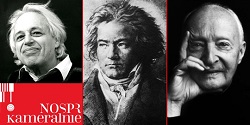 Violinist Rafał Zambrzycki-Payne, horn player Krzysztof Tomczyk and pianist Piotr Sałajczyk will perform works by Beethoven,
Violinist Rafał Zambrzycki-Payne, horn player Krzysztof Tomczyk and pianist Piotr Sałajczyk will perform works by Beethoven, 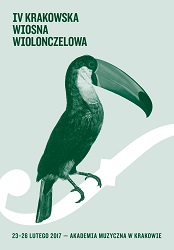 2017 edition of the Krakow Cello Spring will be held between February 23 and 26 at the
2017 edition of the Krakow Cello Spring will be held between February 23 and 26 at the 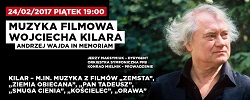 Polish Baltic Philharmonic Symphony Orchestra under
Polish Baltic Philharmonic Symphony Orchestra under 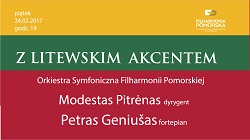 Pomerianian Philharmonic Symphony Orchestra under Modestas Pitrėnas will perform Symphony No. 4, Op. 60 by
Pomerianian Philharmonic Symphony Orchestra under Modestas Pitrėnas will perform Symphony No. 4, Op. 60 by 